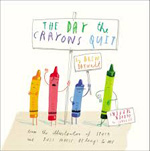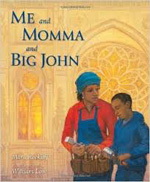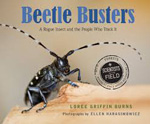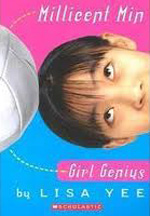The Writing Thief author Ruth Culham led a passionate discussion on mentor texts Oct. 28 as part of the International Reading Association’s first Google Hangout on Air. She was joined by Scholastic authors Varian Johnson (The Great Greene Heist), Kate Messner (Ranger in Time #1: Rescue on the Oregon Trail), and Lisa Yee (Warp Speed). The discussion covered a number of topics, including how to motivate reluctant writers and how exactly to use mentor texts in the classroom, regardless of text length.
Culham said she finds mentor texts every day whether it’s picture books or signs at the zoo. “I learn from texts and I know kids do, too.”
Discussion extended past the live stream into comments posted on YouTube and on Twitter, under #writingthief. Viewers shared their enthusiasm in adding more mentor texts to their classroom libraries, passed along favorite statements of panelists, and agreed with the need for more nonfiction mentor texts and increased diversity across all genres.
During the hour-long panel, the authors presented an impressive list of mentor text suggestions. We’ve compiled a list of every single recommendation, who recommended it and why. Don’t worry, we’ve also created a printable version.
RUTH’S RECOMMENDATIONS:
 The Day the Crayons Quit
The Day the Crayons Quit
by Drew Dewalt (2013)
“This is a delightfully funny book…” The book is an example of a lot of different mentor texts, narrative, opinion and informational, for example.
The Wonderful Wizard of Oz(and the rest of the series)
by L. Frank Baum (1900)
“I know literature influenced my life so much as reader and a writer.” This series was a childhood favorite.
To Kill a Mockingbird
by Harper Lee (1960)
Reading this is a 20-year tradition, every August. “The last time I was noticing just how it was put together and how the vignettes were so carefully seamed together.
One Crazy Summer
by Rita Williams-Garcia (2011)
“It’s just so compelling. It’s layered, it’s textured, it’s tragic. It’s everything.”
 Nino Wrestles the World
Nino Wrestles the World
by Yuyi Morales (2013)
“It’s hilarious, but it’s all brilliantly written.” It addresses Hispanic culture by being “honoring and support of his culture and traditions.”
The Conference of the Birds
by Alexis York Lumbard, Illus. by Demi (2012)
“A retelling of folktales that are culturally sensitive.” Shared recently with literacy educators in Abu Dhabi.
I Will Make Miracles
by Susie Morgenstern, Illus. by Jiang Hong Chen (2008)
“We need to find books that warmly embrace different issues, cultural backgrounds and interesting situations.”
 Bully
Bully
by Laura Vaccaro Seeger (2013)
This book is about the important topic of bullying and this book can open dialog about that. More than that it’s also, “a great example of how a book is put together so thoughtfully.”
Brown Girl Dreaming
by Jacqueline Woodson (2014)
“How could you not want to read a book that is written so elegantly and articulately and flows?”
KATE’S RECOMMENDATIONS:
 The Center of Everything
The Center of Everything
by Laura Moriarty (2004)
Reading short passages, even, is a “great way into that good detailed descriptive writing.”
Bigger than a Bread Box
by Laurel Snyder (2012)
The very first paragraph of this book is great for students to write “detailed memories.” “Deconstructing a single paragraph can help (students) see how specific details really brings (the story) to life.”
My Father the Dog
by Elizabeth Bluemle, Illus. by Randy Cecil (2008)
“This is a funny way into that compare and contrast idea. Much better than comparing a horse and a zebra.”
Ramona the Pest
by Beverly Cleary (1985)
“When I started writing as a kid, I just thought, ‘How did she do that and how did she create this out of thin air and make them so real?!’”
Tales of a Fourth Grade Nothing
by Judy Blume (1972)
These books were like teachers during childhood. The characters were so personal and familiar.
The Hunger Games
by Suzanne Collins (2008)
A good repeat-read to get into the structure of the book. “What was it about the pacing of that book that made it ‘unputdownable.’”
 Me and Momma and Big John
Me and Momma and Big John
by Mara Rockliff, Illus. by William Low (2012)
It’s just a beautiful story about a family and the father goes to work as a stone cutter. It’s not about race, it’s just a story about a family of color. It’s gorgeous.”
The First Strawberries
by Joseph Bruchac and Anna Vojtech (1998)
“All of our cultures have stories.” This is a great way to encourage students to tell their family stories.
Golden Domes and Silver Lanterns: A Muslim Book of Colors
by Hena Khan, Illus. by Mehrdokht Amini (2012)
“There is diversity in where we come from and what we believe. Share this and have children examine their own cultures.”
Anything but Typical
by Nora Raleigh (2009)
A book from the point of view of the main character, who is on the Autism scale, “it is a very different voice than the one in our head.” Books are not only mirrors, but “a window into someone else’s life.”
 Beetle Busters
Beetle Busters
by Loree Griffith Burns and Ellen Harasimowicz (2014)
This is part of the Scientists in the Field series. “These are books I like to call ‘science storytelling.’ Scientists often talk like scientists, not storytellers.”
The Hive Detectives
by Loree Griffith Burns and Ellen Harasimowicz (2010)
“Students can interview scientists in your community and then go back to see how Lori wrote about that.”
A Ranger in Time
by Kate Messner (2015)
“It’s based on real solid history. When you’re reading historical fiction… look not only at the story, but also the author’s note. I’m basically pulling back the curtain on my research.”
LISA’S RECOMMENDATIONS:
 Millicent Min, Girl Genius,Stanford Wong Flunks Big-Time,and So Totally Emily Embers
Millicent Min, Girl Genius,Stanford Wong Flunks Big-Time,and So Totally Emily Embers
by Lisa Yee (2004)
“We use these books for point of view. It’s the same summer, but from the point of view of different characters.” Milicent Min was the first book from a major publisher to feature a modern Asian child on the cover.
All-of-a-Kind Family
by Sydney Taylor (1984)
“Your reader associates. They’re not just reading the story, they’re part of the story.”
Katie John
by Mary Calhoun (1960)
It felt as though, “she wrote that book for me. That is so important.”
Walk Two Moons
by Sharon Creech (1994)
“This is a great book. I left this book, along with To Kill a Mockingbird on the desk when I was writing my first novel.” Reading one sentence can be an inspiration to write.
The Lightning Dreamer: Cuba’s Greatest Abolitionist
by Margarita Engle (2013)
Also in free verse, “the language of this book is just beautiful—and the imagery. My heart broke and my heart sang with the book.”
VARIAN’S RECOMMENDATIONS:
Millicent Min, Girl Genius
by Lisa Yee (2004)
The use of the resume in the opening of the book is a great way to get students “on the page” to start writing.
 Motown and Didi: A Love Story
Motown and Didi: A Love Story
by Walter Dean Myers (1987)
“I got to the back flap and saw a picture of Walter there, looking very astute with his glasses, and it was the first time I realized someone who looked like me could write books. I had never realized that.”
Hard Love
by Ellen Wittlinger (2001)
After reading this book, “I knew I wanted to write books for young people.”
The Westing Game
by Ellen Raskin (1997)
While writing The Great Greene Heist, this was a great mentor text for changing the point of view from one character to another. “You’re bouncing around, but you’re not jostled.”
Locomotion
by Jacqueline Woodson (2010)
Another free verse novel, the main character struggles with poetry. “I find young readers really resonate with it. It’s a way to get them thinking about story in a different form.”
April Hall is editor of Reading Today Online.
Rachel Krall, IRA development manager, contributed to this feature.